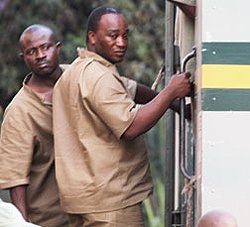By Staff Reporter
The espionage case involving Farai Rwodzi, a businessman with close links to the Solomon Mujuru faction within ZANU PF, took a dramatic twist on Wednesday when the state withdrew the espionage charges before plea.

Prominent banker Rwodzi, a non-executive director at telecoms company Africom Holdings, was arrested alongside acting chief executive Simba Mangwende and Oliver Chiku from Global Satellite Systems. They were accused of illegally setting up satellite communication equipment to leak official secrets to foreign countries.
The three directors will now go on trial on the charge of flouting the Post and Telecommunications Act, with the state insisting they illegally installed satellite equipment. The repressive legislation criminalises the possession or operation of a communication network without permission from the regulating authority.
Harare provincial magistrate Mr Munamato Mutevedzi remanded the three to January 18 next year for trial after the State indicated that investigations on the remaining charge were complete. Although the State dropped the espionage charge, it can still proceed by way of summons should it find substantial evidence.
The defence had sought a refusal of remand on the basis that the facts on the indictment papers did not disclose an offence as alleged. It was also argued that there was no reasonable suspicion to justify the deprivation of liberty of the three. Even if the Africom directors were to be remanded out of custody, the defence still felt it was deprivation of liberty.

The State conceded to the defence submissions and withdrew the espionage charge before plea. After the State withdrew the charges, the defence successfully applied for the alteration of the trio’s bail conditions. The three were reporting to the police twice a week, but that condition was scrapped and they got back their passports.
The defence argued that since the espionage charge, which was more serious in terms of the penalty attracting a maximum of 25 years in prison had been dropped, there was no need for the State to hold on to the trio’s travel documents.
It was further argued that the charge for which the three would face trial has a maximum penalty of US$700 fine and the State is holding more than US$700 in bail. Charges against the Africom directors arose between July and October 27 this year when the three allegedly hatched a plan to send messages to the US, Canada and Afghanistan containing confidential data from Government ministries.
It is alleged Chiku, who is connected to a Canadian firm called Juch Tech, invited the company’s representatives to Zimbabwe. While in Zimbabwe, Chiku allegedly organised a meeting with Rwodzi and discussed the installation of satellite dishes and other equipment capable of transmitting Internet voice over the Internet protocol.
The two allegedly agreed and Rwodzi referred Chiku and Juch Tech representatives to Mangwende. Mangwende, the State alleges, then instructed Africom engineers to install the equipment brought in by Chiku and the Canadians. The equipment was tested and it was fully operational.
Thereafter, the Canadians left the country and police investigations established that the three had bought the equipment in their personal capacities. They allegedly operated the system for three months before their arrest. Advocate Lewis Uriri represented the three while Mr Jonathan Murombedzi appeared for the State.
London based SW Radio Africa however reports that Rwodzi has close links to the Mujuru faction in ZANU PF and speculated on the possible motives behind the arrest. It alleged that members of the Emmerson Mnangagwa faction engineered the arrest “to send a message to Vice President Joice Mujuru, that your husband is no longer here and we can do anything we want.”
Rwodzi basically runs Mujuru’s vast business empire which includes mining, agriculture, transport, tourism and investment in the construction industry. One of the projects, diamond mine River Ranch which was seized from its original owners, is allegedly used to launder illegally smuggled diamonds from the DRC. Illegal DRC gold deals also form part of the Mujuru ‘empire.’
Rwodzi calls Joice Mujuru ‘mainini’ or auntie and is a close relative, hence the trust. SW Radio Africa also claimed that Rwodzi is viewed as the ‘key money man’ in the Mujuru faction and the arrest was made to demonstrate how the Mnangagwa faction now had the upper hand following Solomon Mujuru’s death. “They are trying to show Joice that she is now weak and isolated,” their source said.
SW Radio Africa was told: “It appears the Mnangagwa faction is controlling the police force and they ordered Rwodzi’s arrest. Rwodzi was only released on bail following the intervention of one of his key business partners, Adam Molai, who is married to one of Mugabe’s nieces and is a well-known tobacco merchant. Molai has direct access to Mugabe and convinced him to get Rwodzi released,” he said.
Meanwhile the Canadian firm sucked into the Rwodzi espionage case has described as ‘unfounded’ the allegations that a satellite system supplied by them was used to send state secrets to Canada, the United States and Afghanistan. Juch-Tech president Walt Juchniewicz said the company feels the accusations are ‘very slanderous against its 25-year reputation.”
He said when they visited Zimbabwe they had the approval of the executives and full co-operation of Africom employees. “Africom and the landlord of the property gave their permission to the location of the dish and I was assured by Africom that they had all required licensing to operate in Zimbabwe.” Additional reporting by SW Radio Africa





